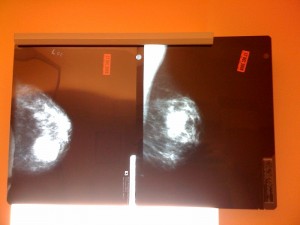
Seventy percent of women who develop breast cancer have no known risk factors. For years, advocates and activists have trumpeted the need for more research into possible environmental causes of the disease. Today, the prestigious Institute of Medicine (IOM) released a much anticipated 360 page study, Breast Cancer and the Environment. But it unfortunately was unable to give women or their doctors any new environmental clues.
As the New York Times reports, most of what the IOM did recommend is already known and might not have much effect anyway.
The most consistent data suggest that women can reduce their risk by avoiding unnecessary medical radiation, forgoing hormone treatments for menopause that combine estrogen and progestin, limiting alcohol intake and minimizing weight gain, the report found. (Controlling weight appears helpful only in preventing postmenopausal breast cancers, not those in younger women.) Overuse of CT scans, which deliver a relatively high dose of radiation, was a particular concern, but the report stated that women should not be deterred from having routine mammograms, which use a much smaller dose. ...
For women who were hoping for definitive safety information about the huge number of chemicals to which people are exposed — from air pollution and cosmetics to cleaning products, food and drinking water — the report may come as a disappointment. It is based largely on a review of existing research, and its limited advice reflects the lack of solid scientific information in many areas of concern to the public.
One of those who was disappointed was Karuna Jaggar, Executive Director of Breast Cancer Action. "I'm frankly shocked. I expected something different," she says. "In a way the report highlights the need for a report about breast cancer and the environment."
Jaggar said she appreciated how difficult it is to prove a link between a specific chemical and breast cancer. Studies of a possible carcinogen cannot be done on humans for ethical reasons, for example.
"The question is what do we do in the meantime?" she said. "Do we wait decades for measurement tools to measure lifetime exposures to many of these chemicals?" She argued for more caution in allowing suspected chemicals or products to be on the market.